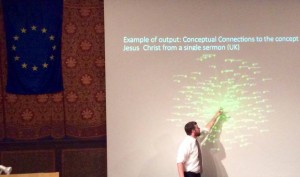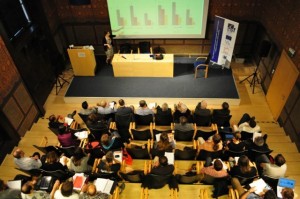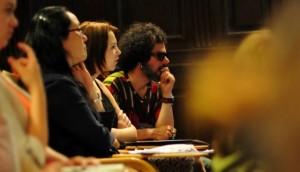The RSP would like to thank Christopher Kavanagh for writing the conference report.
For the past few days I attended the International Association for the Cognitive Science of Religion’s (IACSR) 5th Biennial Conference. The theme this year was focused on addressing the state of the field, 25 years after the cognitive approach to religion (CSR) first appeared (at least in its modern incarnation). I contributed to these efforts by presenting a critical review of the Minimal Counterintuitiveness (MCI) literature, and a short poster that detailed a recoding of a previous study on MCI items in Roman prodigies (Lisdorf, 2001) (for those who may be interested, the recoding reversed the original pattern reported). However, I’m not going to review my own talk (for obvious reasons), nor do I intend to offer a thorough account of the entire conference, instead I’d just like to point out some personal highlights and my impressions of the conference overall.

Unfortunately, at any conference there are times when your energy sags, your attention wanders, or you are preoccupied (such as when you are furiously attempting to make last minute changes to your upcoming presentation). As a result, while I was bodily present for the opening talks and took in the broad strokes of the presentations I feel like I only really got about 70% of the material presented. These talks, however, were perhaps the most important for addressing the state of the field and updating the progress made on various research agendas. The tone overall was positive but, as ever, there were calls for better and more meaningful collaborations to be pursued with our arts and humanities counterparts and an acknowledgement that greater methodological and statistical rigor was required to advance the field. Senior figures, such as Armin Geertz, rather modestly emphasised that the greatest hope for the future of the field lay with the emerging generation of scholars who possess a greater fluency with the firmly established approaches of the humanities and the newer experimental and statistical methods prevalent in modern cognitive research. This was a theme also raised by Ted Slingerland who highlighted the need for culturally bilingual researchers, who would in turn also possess the regional speciality and linguistic competences more often associated with devoted anthropologists or classicists.
Their points were well made and certainly valid however I think established researchers, such as Joseph Bulbulia, who freely admit to coming to statistics later in their careers, also demonstrate that this is a shift that is also occurring in the upper echelons of the field. To what extent it is possible for CSR researchers to bridge the divide with humanities scholars, while simultaneously developing statistical and methodological approaches that are likely to prove alienating to such researchers, is an open question. Personally, while I don’t think CSR researchers should give up on consilience, I think it is also worth looking to cross-cultural psychologists for potentially illuminating collaborations, as the regional specialisation is still there but there is also a shared recognition of the value of quantitative methods. There is no cookie cutter format for successful collaborations but another recurring theme was the need to combine the findings of lab experiments with relevant field research, or at least cross-cultural replications. Dimitris Xygalatas and his collaborators provided successful models for how the two methodologies could be fruitfully combined but such success typically only comes only after many years of preparation and effort.

Getting back to the conference itself, while I enjoyed pretty much all of the talks, three that particularly stood out to me were the presentations of Deborah Kelemen, Paul Reddish and Hein Thomas van Schie. Taking each in turn, Deborah Kelemen presented a very polished summary of the evidence to date for a variety of “early developing conceptual biases” many of which have been presented elsewhere as evidence that humans are “born believers”. I have issues with such a characterisation, see this previous blog post for details, but Deborah actually raised the very same point in her talk, noting that many teleological intuitions are not necessarily in-line with any religious doctrine (i.e. monkeys exist to make the jungle more interesting). She also gave ample time to emphasis the importance of methodological rigor: highlighting the necessity of conducting replications and gathering comparable cross-cultural data. As such, there were a lot of interesting results reported during the talk and, while I was familiar with some of the material, I wasn’t aware of just quite how far earlier findings had been followed up on and expanded. It was a welcome surprise and given that Keleman’s work on the teleological bias was some of the first research I came across that got me interested in the CSR, it was a pleasure to hear how things had progressed.
Paul Reddish’s talk covered some of his research on synchrony and also identified some important theoretical and definitional issues that need to be ironed out if the research is to make progress. The fact that ‘synchrony’ can be used to refer to soldiers marching in step, capoeirastas performing in a roda and a barbershop quartet singing a harmony is indicative of the complexity involved with the concept of ‘synchrony’ and Paul strongly urged for a clear typology to be employed in order that more useful comparisons could be made between studies in the future. This point echoed my own summary of the research literature on counterintuitiveness concepts, which has also suffered from the same problem of inconsistent operationalization and idiosyncratic definitions. Still it is heartening that the field is beginning to recognise and address these issues and doing so may result in the reasons for earlier discrepancies in results becoming better understood.

Hein Thomas van Schie’s presentation discussed his research into afterlife beliefs, which sought to explore the pervasiveness of intuitive mind-body dualist assumptions about whether mental or biological processes continue after death. His talk complemented Keleman’s presentation very neatly as they both employed a variation of Jesse Bering’s “dead mouse” methodology, previously used to examine children’s intuitions concerning the afterlife. The basic methodology involves respondents reading a scenario in which someone has died (in Bering’s original version this was a mouse eaten by a crocodile) and then asking them various questions to assess whether people consider psychological states or biological needs to be still active. Van Schie’s study expanded the psychological aspects addressed and also added in the twist of varying the pre-death beliefs of the deceased (such as whether they were believers or atheists). This additionally enabled comparisons to be made with regards to whether people judged the afterlife of those with opposing or complementary viewpoints to their own differently. The findings were mixed but provided some evidence that ingroup bias may trump theological convictions as in one study atheists were found to attribute more mental activities to a dead atheist than a dead religious person.
There is much more that could be said about these talks and many other very interesting talks that I have not even mentioned. Predictably the issue of definitions of ‘religion’ came up frequently (it was the core subject of Maurice Bloch’s talk for instance), as did the importance of avoiding being academically pigeon-holed as a fringe. However, personally I think that the majority of researchers (and the field in general) have largely addressed these issues (for instance, by abandoning any claim for a single unitary explanation of ‘religion’). Religion is a tricky and perhaps largely artificial category but I don’t agree with those who say it is not useful. Government is an equally fuzzy concept and can be difficult to meaningfully apply to certain historical contexts and societies but, just like religion, as a conceptual or analytical category it remains useful. In short while there is inevitably room for further development and improvement, the conference itself served to illustrate that people within CSR are taking the need for replications (cross-cultural and otherwise), precise definitions and greater methodological rigor seriously. This is a good thing, and with the growing emphasis on collaboration with other disciplines I remain optimistic for CSRs future.




